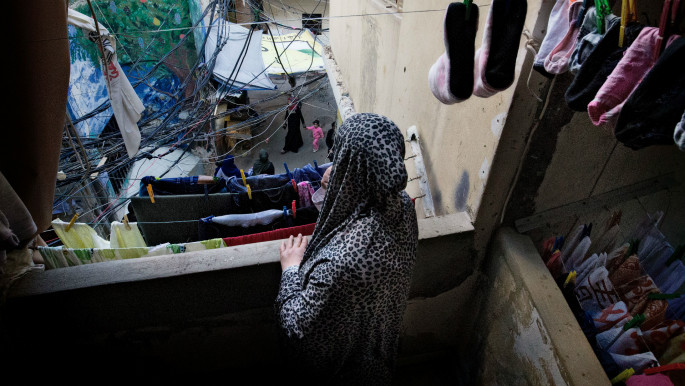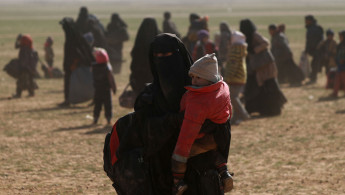Syrian widows struggle with living costs and exploitation
Syrian widows struggle with living costs and exploitation
Syrian widows struggle to provide for their families as they face displacement, exploitation and rising living costs.
4 min read
Syrian women have become the main breadwinners for their families [Getty]
Syrian women pay a high price as Syria continues to experience conflict, siege and displacement, with a death toll estimated at more than half a million people. With many men killed in fighting, this has left many Syrian women to support their families alone, struggling with unemployment, low salaries and high living costs.
Fatima al-Awad is the widow of a young man who died in a strike during the battles in her town in the Yarmouk Basin in Deraa countryside last year.
She sits on a stone by the side of the road, selling biscuits from a cardboard box and moves from one street to another throughout the day, attempting to make enough money to feed her two children.
"After my husband's death, I have no one left in the town, my family lives in Jordan and are struggling there… although they send a small amount of money when they can, I have had to rely on myself to support my children," she told The New Arab, adding that she often takes her baby with her.
"I live in my husband's family house. I go out in the morning to sell biscuits, but the situation in the town is very bad and there are no job opportunities – work is almost non-existent, and most young people are unemployed."
Fatima said that she is prepared to do any work for a little money or food. She is barely able to buy bread or rice, and vegetables are not available.
Fatima al-Awad is the widow of a young man who died in a strike during the battles in her town in the Yarmouk Basin in Deraa countryside last year.
She sits on a stone by the side of the road, selling biscuits from a cardboard box and moves from one street to another throughout the day, attempting to make enough money to feed her two children.
"After my husband's death, I have no one left in the town, my family lives in Jordan and are struggling there… although they send a small amount of money when they can, I have had to rely on myself to support my children," she told The New Arab, adding that she often takes her baby with her.
"I live in my husband's family house. I go out in the morning to sell biscuits, but the situation in the town is very bad and there are no job opportunities – work is almost non-existent, and most young people are unemployed."
Fatima said that she is prepared to do any work for a little money or food. She is barely able to buy bread or rice, and vegetables are not available.
 |
Many have had to leave children behind in their search for work |  |
 |
|
| Read also: 'It wasn't like this in Syria': Displaced women speak out in Lebanon |
Khadija al-Sadu, 20, who lives in northern Syria and has three children, tells her story for The New Arab:
"We were displaced from Yarmouk camp in the south of Damascus. I lost my first husband in the Yarmouk refugee camp, with whom I had a child. I then married another man and gave birth to two more children," she said.
"While I was waiting for the deportation to the northern city of Ariha, my second husband was killed. I found myself alone and responsible for the children. I worked in a doctor's office and a school, I cleaned houses and did any work to save money so I could live."
Many have had to leave children behind in their search for work. Esra, a 35-year-old widow, whose husband died as a result of the regime raids, left the town of Ma'arra in the Aleppo countryside to find work in Turkey, leaving three children between the ages of seven and twelve.
"After my husband's death, the city was dangerous. I have been looking for a safer and more stable place for myself and my children. Turkey has been a refuge for three years now," Esra said.
Although she has escaped the bombing, she has struggled to obtain necessary food and clothing.
"I have just knocked on the doors of humanitarian and relief organisations, hoping to find someone to help me, but in vain."
"While I was waiting for the deportation to the northern city of Ariha, my second husband was killed. I found myself alone and responsible for the children. I worked in a doctor's office and a school, I cleaned houses and did any work to save money so I could live."
Many have had to leave children behind in their search for work. Esra, a 35-year-old widow, whose husband died as a result of the regime raids, left the town of Ma'arra in the Aleppo countryside to find work in Turkey, leaving three children between the ages of seven and twelve.
"After my husband's death, the city was dangerous. I have been looking for a safer and more stable place for myself and my children. Turkey has been a refuge for three years now," Esra said.
Although she has escaped the bombing, she has struggled to obtain necessary food and clothing.
"I have just knocked on the doors of humanitarian and relief organisations, hoping to find someone to help me, but in vain."
 |
Esra said she found only one organisation which offered her assistance, but an aid worker attempted to exploit her, demanding sexual favours in return for aid |  |
"The widow or divorced woman is often seen as easy or cheap, especially when she is alone in a strange country," she said.
"After a while, I found a job through a neighbour in a factory, and I started working with a very low salary. Although it was not enough to meet the basic needs of my family, but it is my duty to bring them back bread at least.
"Today, I work in a sewing factory with a salary that is also low, but I have to accept it as there is a lack of job opportunities, high unemployment and the monopoly of aid by many organisations and their employee's relatives.
"While Syrian women's participation is work has often been low – around 15 percent according to a World Bank estimate in 2015 – more women are now entering the workplace.
"In my experience, society often rejects women working," said Rasha al-Shehad, the head of the Women's Bureau of the local council in the town of Ghadafa in rural Idlib.
"But after women proved their ability to work, society became more receptive. Women working in order to help their families has become more widespread in rural Ma'arra.
"While Syrian women's participation is work has often been low – around 15 percent according to a World Bank estimate in 2015 – more women are now entering the workplace.
"In my experience, society often rejects women working," said Rasha al-Shehad, the head of the Women's Bureau of the local council in the town of Ghadafa in rural Idlib.
"But after women proved their ability to work, society became more receptive. Women working in order to help their families has become more widespread in rural Ma'arra.
"Over the past few years, the number of female heads of households has increased," she said, adding that although there is a segment of society that rejects the work of women, the reality of life in war-torn Syria has meant work for women has become necessary.
Follow us on Twitter: @The_NewArab



